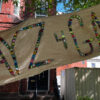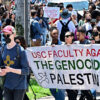Last night, a 19-ton truck plowed into those watching the Bastille Day fireworks display in Nice, France. It drove 1 mile, zigzagging down the packed boardwalk at full speed, before the driver jumped out and was killed in a firefight with French police. Additional weapons were found in the back of the truck.
The attack killed 84 people, though the number may grow. At least two are Americans and 10 children are among the dead, with 50 also injured.
The attack is shocking and barbaric, but much about it is unsurprising.
The perpetrator of the terrorist attack was a French Tunisian named Mohamed Lahouaiej Bouhlel, a 31-year-old with a long history of skirmishes with the law.
Those who carry out attacks on the Islamic State’s, also known as ISIS, behalf in the West tend to have this kind of profile (although it is yet to be confirmed that this is an ISIS-inspired attack). They are usually citizens of the country they attack, and the group has had terrific success in disseminating its ideology among ex-convicts and petty criminals. What is perhaps more surprising is that Bouhlel does not appear to have been on the French intelligence radar at all.
We also cannot be too surprised by the mode of attack. The idea of using a vehicle as a form of weapon has been suggested by both al-Qaeda in the Arabian Peninsula and ISIS in the past.

Graphic: Newscom
“Smash his head with a rock, or slaughter him with a knife, or run him over with your car,” ISIS’ external operations emir, Abu Mohammed al-Adnani, implored in an audio message from September 2014 calling for attacks in the West.
This idea actually came to an American citizen in the United States in 2006. Inspired by al-Qaeda, Mohammed Taheri-Azar injured nine at the University of North Carolina by running over students on campus with his SUV.
It is also unsurprising that it is France that—once again—is suffering. The country has endured a horrendous 18 months.
Just over a month ago, I wrote about the latest Islamist attack on French soil. Yet, think of Charlie Hebdo and the Amedy Coulibaly’s attacks in the following days; the Paris massacre; Tarek Belgacem and Bertrand Nzohbonayo launching separate attacks on police stations; Ayoub el-Khazzani, the shooter on the Thalys train to Paris; Sid Ahmed Ghlam’s murder of a woman and his plan to attack churchgoers only being thwarted when he accidentally shot himself in the leg; and soldiers targeted outside a mosque and Jewish community center attacked in two separate incidents earlier this year. The frequency of attacks is truly disturbing.
What these attacks all have in common, other than being Islamist-inspired, is that none were prevented by good detective work or intelligence gathering. They all slipped under the radar.

Graphic: Newscom
A parliamentary commission recently called for an overhaul of the French intelligence services in response to recent failures. Debate over this will continue; of course, it is hard to stop an attack when all a terrorist has to do is hire a truck and hit the accelerator. Even allowing for this, though, too many attacks are still happening. Clearly, something is not working.
Much work will be done in the coming days. Whether Bouhlel had a broader network around him is an obvious place to start. There will also likely be yet more police raids. France was about to end its post-Paris induced state of emergency; that has now been postponed. A consideration of how to improve both intelligence and integration policy seems inevitable. Attempts to defeat ISIS in Syria, Iraq, and Libya will likely be stepped up.
We must give futility its chance on all this, of course, and some good will hopefully come of it.
Still, no one believes for a second that will be the end of the terrorist onslaught. And there is a concerning follow-up thought to this. Perhaps France has simply hit the limits of its capacity to prevent terrorism. And perhaps the rest of the West is fresh out of ideas as to what to do next.




























